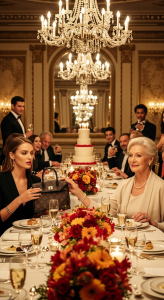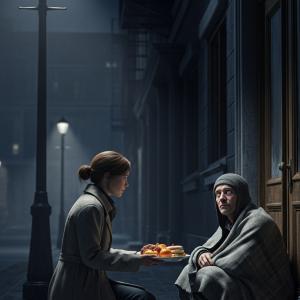The party was a jewel box suspended in the Manhattan sky. From the 70th-floor rooftop of a skyscraper that scraped the clouds, the lights of the city spread out like a carpet of fallen stars. Champagne, the kind that costs more than most people’s rent, flowed from endlessly refilled flutes. A jazz trio played with languid, expensive cool. This was Tiffany Grant-Alistair’s 30th birthday, and it was a masterpiece of performative wealth.
She stood at the center of it all, a queen surveying her court. Dressed in a shimmering, backless gown that was more fashion statement than fabric, she was a vision of trendy, aggressive glamour. Her friends, a flock of equally glossy and voracious women, surrounded her, their laughter high and sharp. Tiffany lived for moments like this: to be seen, to be envied, to be the undisputed center of the universe.
Her husband, Michael Alistair, hovered at her elbow, his handsome face a mixture of adoration and mild anxiety. He was the prince consort to her queen, a man with the impressive title of Executive Vice President at his mother’s company, Alistair Innovations, but with few actual responsibilities. His primary job was to exist beautifully and to facilitate the extravagant lifestyle his wife demanded—a lifestyle made possible by a single, magical piece of plastic in his wallet.
Across the terrace, watching the scene with a quiet, unnerving calm, was the true source of all this splendor: Eleanor Alistair. The founder and CEO of Alistair Innovations, Eleanor was a woman forged in the crucible of the corporate world. Her elegance was the antithesis of Tiffany’s: a timeless, impeccably tailored Chanel suit, a single strand of perfect pearls. She radiated an authority that didn’t need to shout; it was simply present, a gravitational force that bent the room around her.
She stood with her oldest friend, Catherine, watching her daughter-in-law hold court.
“She certainly knows how to spend your money, El,” Catherine murmured, sipping her wine.
Eleanor’s lips curved into a faint, unreadable smile. “Money is a tool, Catherine. It can be used to build or to demolish. I’ve always been curious to see what they would do with it.”
“And what have you concluded?”
Eleanor’s gaze drifted to her son, who was laughing at something vapid Tiffany had said. She had spent years grooming him, preparing him for the day he would take over. She had given him the title, the salary, the access. She had laid a kingdom at his feet, waiting for him to simply walk in and claim it.
“I am about to find out,” Eleanor said softly. She had been dropping hints for months about her impending retirement, about a “major transition” for the company. Michael and Tiffany had heard the hints, interpreting them with a supreme, unshakeable confidence that the throne was his for the taking. Tonight was supposed to be the final, beautiful step in that coronation.
Eleanor took a slow sip of her champagne. “I’m ready to give them an empire,” she whispered, more to herself than to Catherine. “I just need to see a flicker of grace. A single, solitary moment of gratitude.”
On the other side of the rooftop, Tiffany was in the middle of a story, her voice dripping with disdain. “And then Eleanor shows up to the Met Gala in that… that vintage Dior from the eighties. I mean, it was lovely, I suppose, if you’re a history exhibit. I told Michael, ‘Your mother is a brilliant woman, but her wardrobe is a museum.’ We need to be looking forward, not back.” Her friends giggled, their loyalty as cheap and shiny as their sequined dresses. They were basking in Tiffany’s reflected glory, unaware that the entire structure was a mirage, built on the bedrock of the very woman she was mocking.

The moment for the gift arrived. A hush fell over Tiffany’s inner circle as Eleanor approached, holding a large, elegant box wrapped in simple, cream-colored paper and tied with a black satin ribbon. It was a statement of understated class that already seemed to rebuke Tiffany’s loud, glittering aesthetic.
“Happy birthday, Tiffany,” Eleanor said, her voice warm, yet carrying a formal weight. Michael beamed, squeezing his wife’s arm in anticipation. This was it. The grand gesture.
Tiffany took the box, her fingers, tipped with long, blood-red nails, tearing at the paper with barely concealed impatience. She lifted the lid and pushed aside the layers of tissue paper. Inside, nestled in a soft dust bag, was a Hermès Birkin 35 in a classic, impossibly chic shade of ebony box calf leather. It was a vintage piece, perfectly preserved, its quiet magnificence a testament to true, enduring craftsmanship.
It wasn’t just a purse; it was an artifact. An heirloom. A symbol that one had not just arrived, but belonged. For Eleanor, this gift was a deliberate, deeply meaningful olive branch. It was her saying, You are now part of this legacy. You are family.
Tiffany lifted the bag from the box. She held it up, her eyes scanning its clean, structured lines. A strange, contemptuous smirk played on her lips. Her friends leaned in, their eyes wide.
“Oh,” Tiffany said, her voice loud enough for everyone in her orbit to hear clearly. She let out a little, tinkling laugh. “Thank you, Eleanor. It’s… very classic.” She held the bag out at arm’s length, as if it were a strange, slightly distasteful object.
“So wonderfully… retro,” she continued, her eyes glinting with casual cruelty as she looked directly at her mother-in-law. “A real antique. I suppose I can use it to carry my gym clothes. Give it a bit of a modern edge, you know?”
A few of her friends snickered. Others shifted uncomfortably. The air on the rooftop suddenly grew thin and cold. Michael’s smile had evaporated, replaced by a mask of sheer, frozen horror. He looked at his wife, then at his mother, his face pleading, but Tiffany was too absorbed in her own performance to notice. She had asserted her dominance, positioning herself as the youthful, modern arbiter of taste against the stuffy, outdated matriarch. She thought she had won.
But Eleanor did not look angry. She did not look hurt or offended. The warm smile she had worn moments before was gone, replaced by something entirely different. It was a look of absolute, placid calm. A serenity that was more terrifying than any outburst of rage could ever be. It was the calm of a general who had just watched her enemy walk, with blissful ignorance, into a perfectly laid trap.
The silence that followed Tiffany’s remark was heavy and absolute. The jazz trio faltered, a saxophone letting out a squawk before trailing off. All eyes were on the three members of the Alistair family, locked in a tableau of social destruction. Tiffany, still holding the bag, looked smug. Michael looked like he was about to be physically ill. And Eleanor… Eleanor simply smiled.
It was a smile of chilling placidity. A smile that held no warmth, no forgiveness, only the quiet satisfaction of a final, irrevocable decision being made. She let the silence stretch for a beat longer, allowing the full weight of Tiffany’s folly to settle over the crowd.
Then, she turned her gaze away from Tiffany, dismissing her as if she were a piece of furniture. Her eyes landed on her son. Michael flinched, his face pale and clammy.
“Michael, darling,” Eleanor said. Her voice was as sweet and smooth as honey, yet it carried across the terrace with the deadly precision of a sniper’s bullet. Every guest, every waiter, every musician heard it clearly.
“It appears your wife has a certain… distaste for things that come from ‘old ladies’ like me,” she continued, her smile never wavering. “And I would hate for her to be burdened by any more of my… antiques.”
She paused, letting the implication hang in the air for a moment. Tiffany’s smirk began to falter, a flicker of confusion in her eyes. She still didn’t understand. But Michael did. He looked as though he was watching his own life pass before his eyes.
Eleanor delivered the final, fatal blow.
“So, I can only assume she would feel the same way about that supplementary corporate card I issued to you. The one from this ‘old lady.’ It seems only right that you return it. My office, nine o’clock tomorrow morning. Don’t be late.”
Checkmate.
The words descended upon the party like a shroud. The world stopped. That one, simple sentence had just detonated the entire foundation of Michael and Tiffany’s existence. The card. The unlimited, black-as-night American Express Centurion Card that was not a supplementary personal card, but a corporate account. The card that paid for the penthouse on Park Avenue. The card that paid the lease on the matching pair of Maseratis. The card that paid for the couture gowns, the exotic vacations, the society fundraisers. The card that had paid for this very party, from the champagne to the canapés.
Tiffany’s face, which had been flushed with triumph, turned a ghastly, chalky white. The magnificent, priceless bag slipped from her suddenly numb fingers, landing on the stone terrace with a soft, expensive thud. The sound was like a gavel, signaling the end of her life as she knew it. She had just insulted her way out of a multi-million-dollar future. She had traded a kingdom for a cheap laugh.
Michael looked as if he had been struck by lightning. He stared at his mother, his mouth opening and closing silently, no words coming out. He was a puppet whose strings had just been cut, collapsing into a heap of useless, expensive clothes. The empire he was meant to inherit, the legacy he was to be gifted, had just been rescinded. Not in a boardroom, not in a lawyer’s office, but here, in front of everyone, with a single, devastatingly polite sentence.
The party died a swift, awkward death. Guests made hasty excuses, their eyes darting between Eleanor’s serene face and Tiffany’s horrified one. The air of celebration had curdled into the electric tension of a public execution. Within thirty minutes, the rooftop was nearly empty, leaving Michael and Tiffany alone amidst the wreckage of their future.
But Eleanor wasn’t finished. There was one final piece of business to attend to. Just as the last of the guests were leaving, she stepped onto the small stage where the jazz trio had been playing. She tapped a champagne flute with a knife, the clear, ringing sound calling the remaining few to attention.
Michael looked up, a sliver of desperate, pathetic hope in his eyes. Was this it? Was she going to backtrack, to smooth things over, to announce his promotion as planned and pretend the last ten minutes hadn’t happened?
“Friends, colleagues,” Eleanor began, her voice as strong and steady as ever. “I had intended to make a very different announcement tonight. I had planned to speak about the future of Alistair Innovations, about a new generation of leadership.”
She paused, her eyes sweeping the room before landing, for a brief, cold moment, on her son. “However, recent events have given me cause to reflect. They have provided… a moment of profound clarity.”
“I have realized,” she continued, “that the best future for the company I built from the ground up is one of security, stability, and proven leadership. Therefore, I will not be naming a successor from within the family. Instead, I am announcing my retirement, effective at the end of this fiscal quarter. And I am pleased to inform you that I have accepted a long-standing acquisition offer from the Kaito Corporation of Japan. Alistair Innovations has been sold.”
If her first announcement had been a targeted missile, this was a nuclear bomb. The professional destruction was complete. Michael’s dream of being CEO didn’t just vanish; the very company he was meant to lead would no longer exist under his family’s name. He had not only lost his personal fortune; he had lost his inheritance, his career, and his entire identity in a single night. He sank into a nearby chair, his body finally giving up, a hollowed-out man.
The financial destruction began the next morning. Michael’s attempt to pay for coffee was met with the quiet shame of a declined card. A call to the bank confirmed it: the account had been frozen and closed. Within hours, calls began to come in. The leasing agent for their cars. The management company for the penthouse. And, most humiliatingly, the catering manager for the rooftop venue, presenting them with an invoice for the party that now felt like a funeral. An invoice for over one hundred thousand dollars, for which they were now personally liable.
Their relationship, a fragile thing built on the scaffolding of money and status, crumbled into dust under the weight of this new reality. The penthouse, once their palace, became a war zone.
“How could you be so stupid?” Michael screamed, his voice raw with a despair he had never known. “How could you throw everything away for a cheap joke? Everything! Our entire life!”
“Me?” Tiffany shrieked back, her face a mask of furious denial. “You’re the one who stood there like a scared little boy and let her do it! You’re her son! Why didn’t you do something? You’ve always been weak! A spoiled child living on his mommy’s money, and now the money is gone!” They were trapped, lashing out at each other because the true architect of their ruin was untouchable, already moving on to her next chapter.
One year later, the name Alistair Innovations was gone, absorbed into the global machinery of the Kaito Corporation. And Eleanor Alistair was a ghost, having vanished from the New York social and business scenes she had once dominated. She had not, however, retired to a quiet life of leisure. She had been reborn.
The Eleanor Grant Foundation was launched with an initial endowment of two hundred million dollars. Its mission was simple and direct: to provide seed capital and mentorship for start-ups founded and run by women. Eleanor had taken the disappointment in her own heir and transformed it into an engine of opportunity for a thousand new daughters.
She was in San Francisco, attending the launch of a revolutionary biotech firm run by a brilliant young scientist she had funded, when Catherine reached her by phone.
“I saw them,” Catherine said, her voice a mix of pity and morbid curiosity. “Michael and Tiffany.”
Eleanor, looking out over the Golden Gate Bridge from her hotel suite, felt a pang of… nothing. Just a mild, distant curiosity. “Oh? And how are they?”
“They’ve downsized. Considerably,” Catherine reported. “They’re in a small two-bedroom in Queens. He’s working some mid-level marketing job. She’s trying to be a social media influencer, apparently. It’s not going well. They looked… tired. And angry.”
Eleanor was silent for a moment. There was no joy in her, no sense of victory. Their fate was an unfortunate but necessary consequence of their own choices. A failed experiment.
“Well,” Eleanor said, her voice clear and forward-looking. “I wish them the best. I have to run, Catherine. We’re about to celebrate a company that might just change the future of medicine.”
She hung up the phone. Her past was a closed book, a story that was over. Her future was here, in this room, with these bright, ambitious women who possessed the one quality her son and his wife had so fatally lacked: gratitude.
Eleanor Alistair had spent a lifetime building an empire, hoping to pass it down. Instead, she had been given a greater gift: freedom. Freedom from the burden of ungrateful children, freedom from the expectations of a legacy, freedom to use the fruits of her own hard work to build something that would truly last. She had traveled the world, funded innovation, and created a new family from the worthy strangers she chose to uplift. She had lost a son, but she had gained the world. And she had never been happier.




